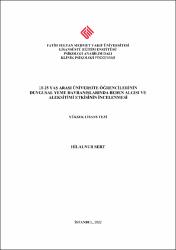18-25 Yaş Arası Üniversite Öğrencilerinin Duygusal Yeme Davranışlarında Beden Algısı ve Aleksitimi Etkisinin İncelenmesi
Citation
SERT, Hilalnur,18-25 Yaş Arası Üniversite Öğrencilerinin Duygusal Yeme Davranışlarında Beden Algısı ve Aleksitimi Etkisinin İncelenmesi, Fatih Sultan Mehmet Vakıf Üniversitesi Lisansüstü Eğitim Enstitüsü Psikoloji Anabilim Dalı Klinik Psikoloji Programı, Yayımlanmamış Yüksek Lisans Tezi, İstanbul 2022.Abstract
Bu çalışmanın amacı aleksitimi ve beden algısının duygusal yemeye etkisini incelemektir. Çalışma Türkiye’nin çeşitli üniversitelerinde eğitimine devam eden 341 öğrenci ile yürütülmüştür. Katılımcılardan Kişisel Bilgi Formu, Duygusal Yeme Ölçeği, Vücut Algısı Ölçeği ve Toronto Aleksitimi Ölçeği aracılığıyla veriler toplanmıştır. Değişkenler arasındaki ilişkiyi incelemek amacıyla yapılan Pearson Korelasyon analizi sonucunda aleksitimi, duyguları tanımada güçlük ve duyguları söze dökmede güçlük ile duygusal yeme ve duygusal yemenin faktörleri arasında pozitif yönlü istatistiki olarak anlamlı bir ilişki bulunmuştur; beden algısı ile duygusal yemenin faktörleri arasında negatif yönlü istatistiki olarak anlamlı bir ilişki bulunmuştur. Aleksitimi ile beden algısının duygusal yeme ve duygusal yemenin faktörlerine etkisini incelemek amacıyla yapılan Çoklu Doğrusal Regresyon analizi sonuçlarına göre beden algısı tüm modellerde yordayıcı olarak yer alırken, duyguları tanımada güçlük ve duyguları söze dökmede güçlük faktörleri bazı modellerde yordayıcı olarak yer almıştır. Sosyodemografik değişkenler olan cinsiyet ve medeni durum kategorilerine göre duygusal yeme yordayıcılarının farklılaşıp farklılaşmadığını incelemek amacıyla yapılan Çoklu Doğrusal Regresyon analizi sonuçlarına göre beden algısının çoğu modelde, duyguları tanımada güçlük ve duyguları söze dökmede güçlük faktörlerinin ise bazı modellerde yordayıcı olarak yer aldığı görülmüştür. Sonuçlar literatür çerçevesinde tartışılmıştır. The purpose of this study is to investigate the effects of alexithymia and body image on emotional eating. The study was conducted on 341 college students who are continuing their education in various colleges around Turkey. Data was collected from participants by Personal Information Form, Emotional Eating Scale, Body Image Scale and Toronto Alexithymia Scale. According to the results of the Pearson Correlation Analysis which was conducted to investigate the relation between the variables, there is a statistically significant positive correlation between emotional eating, factors of emotional eating and alexithymia, difficulty to name the emotions, difficulty to verbalize the emotions while there is a siginficant negative correlation between body image and factors of emotional eating. According to the results of Multiple Linear Regression Analysis which was conducted to investigate the effects of alexithymia and body image on emotional eating and the factors of emotional eating, body image is a predictor in all models, while the factors of difficulty to name the emotions and the difficulty to verbalize were predictors in some models. The results of the Multiple Regression Analysis which was carried out to investigate whether the emotional eating predictors differentiate according to sociodemographic variables, such as sex and marital status; body image is a factor in all models and the factors, the difficulty to name the emotions and the difficulty to verbalize were predictors in some models. The results were discussed according to the literature.



















